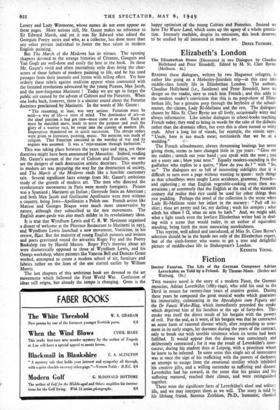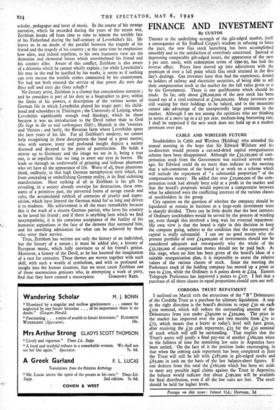Fiction
THIS massive novel is the story of a modern Faust, the German musician, Adrian Leverkiihn (1885-1940), who sold his soul to the Devil in return for twenty-four years of creative genius. During these years he composed the great musical works which guarantee his immortality, culminating in the Apocalypsis cum Figuris and the Dr Fausti Wehe-Rlag, which immediately preceded the stroke which deprived him of his faculties at the age of forty-five. This stroke was itself the direct result of his bargain with . the powers of evil. For the seal, as it were, of his bargain was that he contracted an acute form of venereal disease which, after ,responding to treat- ment in its early stages, lay dormant during the years of the contract, only to break out with terrible virulence when its terms had been fulfilled. It would appear that the disease was consciously and deliberately contracted ; for it was the result of Leverkiihn's inter- course, during his student days at Leipzig, with a prostitute whom he knew to be infected. In some sense this single act of intercourse was at once the sign of his trafficking with the powers of darkness, an attempt to- escape from the emotional sterility which inhibited his creative gifts, and a willing surrender to suffering and disease. Leverkiihn had his reward, in the sense that his genius and his suffering matured, reached their climax, and were extinguished together.
These were the significant facts of Leverkiihn's aloof and solitary life, and we may interpret them as we will. The story is told by his lifelong friend, Serenus Zeitblom, Ph.D.. humanist. classical
scholar, pedagogue and lover of music. In the course of his strange narrative, which he recorded during the years of the recent war, Zeitblom breaks off from time to time to lament the terrible fate of his Fatherland during the half-century of Leverkiihn's life. He leaves us in no doubt of the parallel between the tragedy of his friend and the tragedy of his country ; at the same time he emphasises how alien, and indeed repellent, to his own humanist view are the demoniac and elemental forces which overwhelmed his friend and his country alike. Aware of this conflict, Zeitblom is also aware of a dilemma which he cannot wholly explain ; for while Leverkiihn's life may in the end be justified by his works, it seems as if nothing can ever excuse the terrible crimes committed by his countrymen. Yet had not both entered the service of that power die stets das Bose will and stets das Gute schafft ?
No literary artist, Zeitblom is a clumsy but conscientious narrator ; and he considers it part of his duty as a biographer to give, within the limits of his powers, a description of the various scenes of German life in which Leverkiihn played his tragic part : his child- hood and schooldays in Thuringen ; the University of Leipzig, where Leverkiihn significantly enough read theology, which he chose because it was an introduction to the Devil rather than to God (Es liegt in ihr so viel verbongnes Gift); Munich in the 'twenties and 'thirties ; and lastly, the Bavarian farm where Leverkiihn spent the later years of his life. For all Zeitblom's modesty, we cannot help recognising in these descriptions the hand of a great master, who with sorrow, irony and profound insight depicts a society diseased and decayed to the point of putrefaction. He holds a mirror up to Germany and the image we see in it, being a true one, is so repellent that we long to avert our eyes in horror. He leads us through an underworld of grinning and hideous phantoms who yet have all the appearance of life. Worst of all, these phantoms think, endlessly, in that high German metaphysical style which, far from concealing or embellishing German reality, is its final sickening manifestation. Most striking of all in Zeitblom is his gift for revealing, in a society already overripe for destruction, these rem- nants of a primitive past, the perverted forms of savage creeds and cults, the accumulated rubbish of centuries of cruelty and super- stition, which have littered the German mind for so long and driven it to madness. His achievement is all the more remarkable because this is the work of a sincere German patriot, who loves his country as he loved his friend ; and if there is anything here which we find unsympathetic, it is his conscious acceptance of the futility of his humanist aspirations in the face of the demons that surround him, and his unwilling admiration for what can be achieved by those who enter their service.
Thus, Zeitblom has written not only the history of an individual, but the history of a nation ; it must be added also, a history of European music, which fully convinces us of his friend's genius. Moreover, a history of the Devil, as he has haunted the imagination of a race for centuries. These themes are woven together with such skill, with such a wealth of symbolism, and with so profound an insight into the human situation, that we must count Zeitblom one of those unconscious geniuses who, in attempting a work of piety,
find that they have created a masterpiece. GORONWY REES.







































 Previous page
Previous page